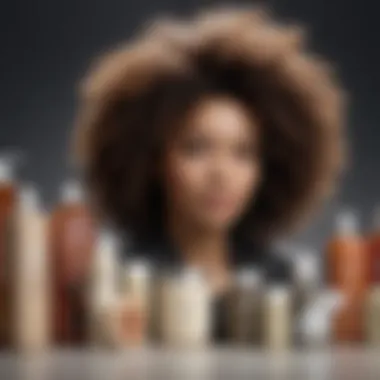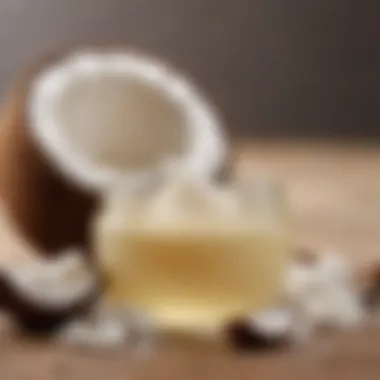Natural Hair Products Unveiled: Benefits & Trends


Intro
Natural hair products have become a focal point in the beauty industry. The transformation in consumer preferences highlights an increasing desire for environmentally conscious and sustainable solutions. As individuals seek ways to improve their hair health, understanding the various formulations and ingredient benefits becomes essential. This article explores these intricacies thoroughly, bridging the gap between consumers and the evolving market.
As the beauty landscape shifts, the importance of ingredient awareness rises. Many consumers now seek products that align with their values. This exploration will delve into the essential aspects regarding the formulations, benefits, and the diverse options available in natural hair care products. By closely examining the market and its dynamics, we aim to empower readers with knowledge.
Trending Topics
Current Fashion Trends
Fashion is constantly evolving, and hair care trends play a significant role in shaping styles. Currently, there is a noticeable shift towards natural textures and styles.
- Curly and textured hair is celebrated.
- Braid styles are seeing a resurgence in popularity.
- Hair accessories are increasingly being utilized to enhance looks.
Beauty Innovations
With the rise in demand for natural hair products, numerous innovations have emerged. Brands are continually reformulating and enhancing their products to meet consumer needs. Some of the notable innovations include:
- Use of plant-based ingredients.
- Eco-friendly packaging solutions.
- Advanced formulations targeting specific hair issues based on type and condition.
"Understanding these trends allows consumers to stay ahead and make informed purchasing decisions."
Step-by-Step Guides
Choosing the Right Product
Selecting the right hair product involves several factors. Here are some tips to help narrow down choices:
- Assess hair type: Determine if your hair is straight, wavy, curly, or coily.
- Recognize hair needs: Identify if your hair is dry, oily, fine, or thick.
- Read ingredient labels: Look for natural, recognizable ingredients.
- Research brands: Prioritize brands committed to sustainable practices.
Establishing a Routine
Creating a consistent hair care routine can greatly improve overall health. Here's a simple routine:
- Shampoo: Use a sulfate-free natural shampoo.
- Condition: Apply a rich conditioner that hydrates the hair.
- Treatments: Incorporate deep conditioning or oil treatments weekly.
- Styling: Opt for natural styling products that suit your hair type.
Product Reviews
In-Depth Analysis of Popular Items
When exploring natural hair products, consider popular lines known for their effectiveness. Brands like SheaMoisture and Briogeo have received noteworthy attention. They provide formulations that cater to various hair types while maintaining a commitment to sustainability.
Comparative Reviews
To make informed decisions, consumers can compare products based on:
- Ingredients.
- Effectiveness for hair needs.
- Price points.
In summary, understanding and selecting natural hair products can significantly impact hair health. By being informed about the trends, ingredients, and practical application guides, consumers can confidently navigate their beauty choices in today’s eco-friendly landscape.
Intro to Natural Hair Products
The realm of natural hair products has gained significant attention in recent years. As consumers become more aware of their choices, they seek out products that align with their values of health and environmental sustainability. Natural hair products are not just a fleeting trend; they represent a fundamental change in how individuals view personal care. They offer a variety of benefits, including healthier hair and scalp, reduced chemical exposure, and often are crafted from renewable resources.
Definition and Overview
Natural hair products refer to formulations that prioritize botanical ingredients over synthetic ones. These products typically include a blend of oils, extracts, and proteins that nourish and invigorate the hair and scalp. Key characteristics of natural hair products include the absence of harmful chemicals such as sulfates, parabens, and artificial fragrances. Understanding what constitutes a natural hair product is essential for consumers wanting to make informed decisions. This knowledge can also guide individuals in selecting products that suit their specific hair types and needs.


The Shift Toward Natural Products
Over the last decade, there has been a notable shift in consumer preferences. More women are opting for products that are eco-friendly and non-toxic. This change is influenced by several factors, including increased environmental awareness and the rise of social media, which amplifies discussions about personal care ingredients. The demand for transparency and clean labeling has grown, pushing brands to reformulate their offerings. Consequently, many established brands have introduced natural lines or revamped their existing products to meet this new consumer demand.
"Natural beauty is not just a trend; it reflects a profound understanding of ingredients and their impact on health and the planet."
In summary, the increasing interest in natural hair products highlights a broader movement toward wellness and sustainability. Consumers aim to make choices that not only enhance their beauty but also uphold their ethics, leading to a more mindful market landscape.
Key Ingredients in Natural Hair Products
Understanding the ingredients in natural hair products is critical. These components not only determine the product's effectiveness but also influence its safety and suitability for different hair types. The move towards more sustainable and eco-friendly options has made consumers more selective about what they apply to their hair. This section explores some of the most commonly used ingredients in natural hair care, focusing on plant-based oils, herbal extracts, and natural proteins. Each ingredient has unique benefits and characteristics that contribute to healthier hair and scalp.
Plant-Based Oils
Jojoba Oil
Jojoba oil is renowned for its ability to closely mimic the natural oils produced by the scalp. This unique property makes it an effective moisturizer. It helps in balancing oil production, making it suitable for various hair types. Additionally, jojoba oil is rich in vitamins and minerals, which promote hair growth and health. It is often used to strengthen hair strands and can effectively alleviate dryness and frizz. However, some individuals may experience an allergic reaction, so patch testing is advisable.
Coconut Oil
Coconut oil has gained immense popularity as a versatile hair product. Its main benefit lies in its ability to penetrate deep into the hair shaft, providing intense hydration. This oil can enhance shine, improve elasticity, and reduce protein loss. Coconut oil also contains lauric acid, which has antibacterial properties, helping to maintain scalp health. Nevertheless, it can be heavy for fine hair, possibly leading to greasiness if not used judiciously.
Argan Oil
Argan oil is often touted as liquid gold for hair. This oil is high in essential fatty acids, which can nourish and hydrate hair. Its lightweight texture allows it to be absorbed easily, making it an exceptional choice for smoothing and taming frizz. Argan oil also offers heat protection, making it beneficial for those who frequently use styling tools. However, due to its cost, some consumers may find it less accessible compared to other natural oils.
Herbal Extracts
Aloe Vera
Aloe vera is a staple in many natural hair products due to its soothing properties. It is known for its ability to hydrate and nourish the scalp, which promotes healthy hair growth. The enzymes in aloe vera help in removing dead skin cells and excess sebum, keeping the scalp clean and healthy. Although generally safe, some users may experience an adverse reaction, so it is best to use it in moderation.
Rosemary
Rosemary is not just a culinary herb; it also supports hair health. It is believed to stimulate hair growth and improve circulation in the scalp. Rosemary oil can also help in combating dandruff and may prevent premature graying. Its invigorating scent serves as a pleasant bonus. However, individuals with sensitive skin should take care, as it can cause irritation.
Chamomile
Chamomile is often used for its calming effects and is particularly beneficial for those with sensitive scalps. This extract can enhance hair color, especially in lighter shades, giving a natural shine and brightness. Chamomile is also known for its anti-inflammatory properties, making it an excellent choice for soothing irritation. Some individuals may find chamomile lightening their hair more than they wish, necessitating cautious application.
Natural Proteins
Keratin
Keratin is a vital protein that is naturally found in hair, skin, and nails. Its application in hair care products helps to replenish damaged hair and improve overall texture. Keratin treatments can restore strength, reduce breakage, and enhance shine. While keratin is a popular choice for smoothing treatments, some individuals may require specifically formulated products due to varying hair types.
Soy Protein
Soy protein is a valuable ingredient in natural hair formulations due to its ability to strengthen hair. It penetrates the hair shaft, providing moisture and enhancing elasticity. This protein can also help in repairing damage and improving fullness. Although generally well-tolerated, soy allergies can occur, so users should be cautious if they have a known sensitivity.
The effectiveness of natural hair products largely depends on their key ingredients. Understanding each ingredient allows consumers to make informed choices that align with their specific hair care needs.
Benefits of Using Natural Hair Products
Natural hair products offer a variety of benefits that appeal to individuals seeking healthier hair and a sustainable lifestyle. As consumers become more informed about the impact of their choices on both personal health and the environment, the advantages of these products increasingly come into focus. When discussing the benefits, it is essential to consider how they contribute to hair health, environmental responsibility, and reducing harmful chemical exposure. Each of these elements plays a crucial role in the broader narrative of hair care and personal grooming.
Healthier Hair and Scalp


Using natural hair products can significantly improve the overall health of hair and scalp. Many people deal with scalp issues such as dryness, irritation, or dandruff. All of these conditions can stem from harsh chemicals commonly found in many conventional hair care items. Natural products contain gentle ingredients that nourish and hydrate the scalp. For instance, plant-based oils like coconut oil and jojoba oil provide essential moisture, promoting hair growth and reducing breakage.
Natural hair products often utilize herbal extracts like aloe vera and rosemary, known for their soothing and healing properties. These ingredients work synergistically to help maintain the scalp's natural balance, leading to reduced itchiness and flakiness. In turn, healthier scalp conditions create an optimal environment for hair to thrive. People who switch to natural formulations may notice improvements in shine, texture, and overall hair vitality.
Environmentally Sustainable Choices
The movement toward using natural hair products aligns closely with the growing awareness of eco-friendly practices. Many companies producing these items prioritize sustainability in their sourcing and packaging. By choosing products that are derived from renewable resources and manufactured with minimal environmental impact, consumers can contribute to the conservation of ecosystems.
Natural hair products often come in recyclable or biodegradable packaging, reducing waste. When selecting such products, consumers are not only making a choice for their hair but also for the planet. This conscious consumption fosters a sense of responsibility and awareness about the impact of personal grooming routines on global environmental issues.
Reduced Exposure to Chemicals
One of the most compelling reasons to opt for natural hair products is the reduction in harmful chemical exposure. Conventional hair care items often contain sulfates, parabens, and synthetic fragrances. These substances can lead to adverse effects on both hair and skin health. Some consumers experience allergic reactions or irritations due to the usage of these harsh chemicals.
In contrast, natural hair products utilize ingredients sourced from nature. They often lack the synthetic additives that can be detrimental to well-being. By incorporating these products into their hair care routines, users can enjoy peace of mind, knowing they are making safer choices for their bodies. Reducing chemical exposure can lead to less hair breakage, improved scalp conditions, and an overall enhanced experience when caring for hair.
"Choosing natural hair products can create a significant positive impact on both individual health and the environment."
Selecting the Right Natural Hair Product
Choosing the right natural hair product is a vital step for anyone looking to enhance the health and appearance of their hair. The vast array of products available can leave consumers feeling overwhelmed. By understanding individual hair types and specific product benefits, selecting a suitable product can lead to better outcomes in hair care routine.
The first aspect to consider is hair type. Different hair types—curly, straight, and wavy—have unique needs. Using products formulated for a specific hair texture can significantly improve moisture retention, manageability, and overall hair health.
Moreover, well-informed choices reduce the likelihood of irritation or adverse reactions, common when using products that do not align with one's hair type. Recognizing the ingredients is also essential. Understanding what each component does can help consumers make choices that promote long-term hair health rather than focusing merely on short-term cosmetic solutions.
In short, selecting the right natural hair product goes beyond personal preference. It involves a connection between the product and the hair type, leading to better nourishment, improved aesthetics, and enhanced hair vitality.
Understanding Hair Types
Curly Hair
Curly hair is characterized by its unique structure. Each curl can vary in tightness, density, and elasticity. This hair type tends to be drier than others because natural oils struggle to travel down the twists and turns. Therefore, products that provide intense moisture are essential.
One key characteristic of curly hair is its propensity to frizz. To combat this, curly-haired individuals often benefit from creams and oils that can seal moisture while defining curls. For those with curly hair, using products rich in emollients such as shea butter can effectively smooth frizz and add shine. Although wonderful in texture, it may require extra effort in maintaining moisture balance, making the choice of products critical.
Straight Hair
Straight hair is typically shinier and less prone to tangling, allowing natural oils to travel more easily from the scalp to the ends. However, this doesn’t mean it lacks its challenges. Straight hair can become oily more quickly, necessitating products that maintain balance without weighing hair down.
A key trait of straight hair is its adaptability. People with this type can choose a variety of styles. Thus, lightweight shampoos and conditioners that do not contain heavy silicones can help keep it voluminous and healthy. Yet, straight hair can also get greasy, making it essential to select products that clean effectively while providing essential moisture.
Wavy Hair
Wavy hair falls between straight and curly textures, possessing loose curls that create waves. This hair type is versatile; it can often look good with either a natural style or a polished look. However, waves require hydration and defined products to manage frizz, especially in humid conditions.
A prominent characteristic of wavy hair is its tendency to become limp without proper product use. Adding sea salt sprays can enhance texture, while creamy conditioners prevent dryness. The challenge here lies in finding the right balance: too much product can weigh down the waves, while too little can lead to frizz. Wavy hair needs careful selection to achieve optimal results.
Product Label Insights
Reading product labels requires understanding key terminology and ingredients. Labels can often appear convoluted, making it difficult to identify the right product for specific needs. Ingredients are usually listed in descending order; thus, those listed first are present in the highest concentration.
Look for terms like "sulfate-free" or "paraben-free" as these indicate a gentler formulation that aligns with natural hair care philosophies. Additionally, pay attention to certifications such as organic or cruelty-free, as these can indicate product quality and ethical considerations. Deciphering these elements on labels can foster confidence in selection, ensuring the right product aligns with personal values and hair needs.
Reading Customer Reviews
Customer reviews can offer insights into product effectiveness and user experiences. Reviews help gauge how specific hair types respond to the product, shedding light on real-world performance. They can reveal potential reactions, longevity, and overall satisfaction, which are often not detailed in marketing materials.


When engaging with reviews, prioritize those from individuals with similar hair types. Diversifying feedback can give a rounded perspective on a product’s potential effectiveness. In addition, watch for common themes in comments, particularly regarding moisturizing properties and scent. This information can aid significantly in making an informed purchasing decision.
"Understanding your hair type and reading labels are essential steps in selecting the right natural hair product. It is not just about personal preference; it's about choosing what works best for your individual needs."
The Role of Branding and Marketing
Branding and marketing play crucial roles in the natural hair care industry. As consumers become more conscious about the products they use, the influence of a brand’s identity and its marketing strategies cannot be overlooked. The differentiation in this market largely stems from how brands position themselves to resonate with their target audiences. The significance of branding lies not just in aesthetic appeal but also in the values that a brand embodies. For instance, a brand's commitment to sustainability can enhance its reputation and build trust among consumers.
In addition, the marketing approach significantly shapes consumer perceptions and buying behaviors. Strategies that prioritize transparency and education can foster loyalty and encourage consumers to make informed choices. This is especially important in the beauty sector, where misinformation can lead to skepticism regarding product efficacy.
Trends in the Natural Beauty Market
The natural beauty market is currently witnessing substantial growth driven by evolving consumer preferences. One prominent trend is the increasing demand for clean beauty products. Consumers look for items free from harmful chemicals and agree with ethical sourcing practices. This focus on safety and environmental impact is leading brands to reformulate their offerings to meet these expectations.
Another significant trend is the rise of personalization in product offerings. Brands are leveraging technology to analyze customers' needs and recommend suitable products. For example, using quizzes or AI, brands like Function of Beauty allow consumers to create customized hair care solutions.
Social media has also radically transformed how brands engage with consumers, creating a platform for direct interaction and feedback. This immediate communication builds community and fosters brand loyalty.
Consumer Perception of Brands
Understanding consumer perception is essential for brands operating within the natural hair product space. Factors such as sustainability, ingredient transparency, and brand ethos influence how consumers judge a product's worth. For instance, a brand like SheaMoisture has positioned itself as a champion for inclusivity, appealing to a diverse demographic.
Moreover, word-of-mouth and social proof are potent forces in shaping brand perception. Reviews and testimonials on platforms like Reddit and Facebook can significantly impact a potential buyer's decision-making process. Consumers often trust the opinions of their peers more than conventional advertising, emphasizing the importance of cultivating positive brand experiences.
The growing trend of advocacy among brands, where they take firm stands on social and environmental issues, has also changed the landscape. Brands that align with consumers' values attract more loyalty. This close alignment can lead to higher customer retention rates and long-term success.
"People don't buy what you do; they buy why you do it." – Simon Sinek
Emerging Trends in Natural Hair Care
The landscape of natural hair care is continually evolving. Emerging trends play an essential role in shaping how consumers interact with their hair care products. This section will explore how innovation, consumer preferences, and societal influences converge to create a dynamic market. Moreover, understanding trends can help women choose products that not only suit their hair types but also align with their values.
Innovative Product Offerings
As awareness of the benefits of natural ingredients grows, brands are responding by developing innovative product offerings. Companies now experiment with new formulations that combine traditional ingredients with modern technology. For instance, lightweight oils and creams that hydrate without weighing hair down can be found. Additionally, brands are offering customized products tailored to specific hair concerns. These formulas often include superfoods such as quinoa or hemp, which provide additional nourishment.
Furthermore, some brands are focusing on eliminating common irritants. By avoiding sulfates, parabens, and synthetic fragrances, these products aim to promote hair health without compromising on effectiveness. This pivot towards transparency and safety resonates well with consumers.
The trend of packaging is also noteworthy. Many brands are adopting eco-friendly practices, using recyclable materials, and even refillable containers. This is aimed at both reducing waste and appealing to environmentally conscious shoppers.
The Impact of Social Media
Social media has reshaped how consumers view and interact with natural hair products. Platforms like Instagram, TikTok, and YouTube provide spaces where users share personal experiences and product reviews. This phenomenon influences purchase decisions significantly.
With user-generated content at the forefront, viewers trust recommendations from peers rather than traditional advertisements. The hashtag culture surrounding natural hair care has led to increased visibility for niche brands. Creators often promote specific products through tutorials, reviews, and demonstrations. Consequently, brands can reach a high-IQ audience that seeks authenticity.
Moreover, trends like the "clean beauty" movement gain traction through these channels. Influencers highlight the importance of ingredient sourcing and ethical production. This has prompted consumers to scrutinize what goes into their products closely.
"The rise of social media has transformed consumerism; personal stories now drive brand loyalty and shape market trends."
Epilogue
The conclusion serves as a significant closing chapter in this exploration of natural hair products. It encapsulates primary insights covered throughout the article, providing clarity and highlighting essential concepts. Understanding the benefits, key ingredients, and the role of branding in natural hair care is valuable for making informed decisions.
Summarizing Key Takeaways
Natural hair products cater to various hair types and individual needs, combining health benefits with eco-friendly principles. Here are the key takeaways:
- Healthier Hair: Utilizing natural ingredients can result in healthier, shinier hair while reducing damage. Plant-based oils such as Jojoba and Argan play crucial roles in nourishing and protecting hair.
- Environmental Impact: Choosing products designed for sustainability supports not only personal wellness but also the planet's health. Consumers should prioritize brands that advocate for sustainable practices.
- Awareness of Ingredients: Understanding labels is essential. Learning to identify beneficial ingredients and avoid harmful substances can lead to more informed purchases.
- Consumer Education: Social media influences perceptions and choices. Engaging with trusted sources can clarify trends and result in better product selections.
Encouragement for Informed Choices
It is essential to encourage consumers to make choices based on informed understanding rather than trends. Here are some considerations to keep in mind:
- Research Before Buying: Utilize online resources to assess product reviews and ingredient lists. Websites like reddit.com often provide real user experiences that can guide your purchasing decisions.
- Trial and Error: Finding the right products may take some experimentation. What works for one person may not suit another. Therefore, patience and testing various options are vital.
- Stay Updated: The natural hair care market evolves continually, introducing innovative products and approaches. Follow credible sources like britannica.com to keep abreast of the latest research and developments.



